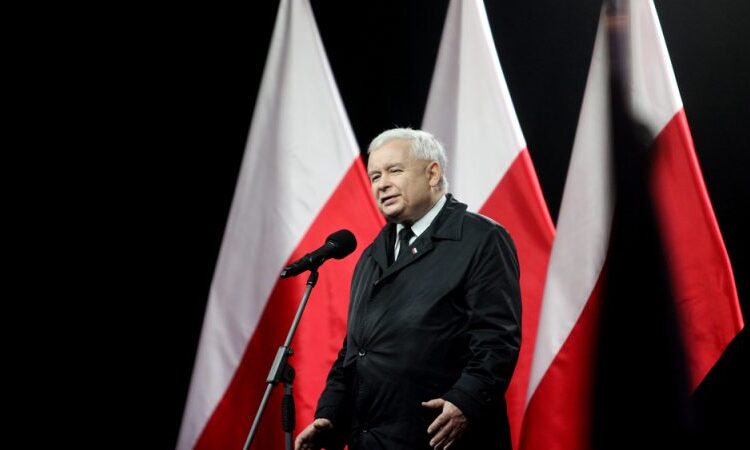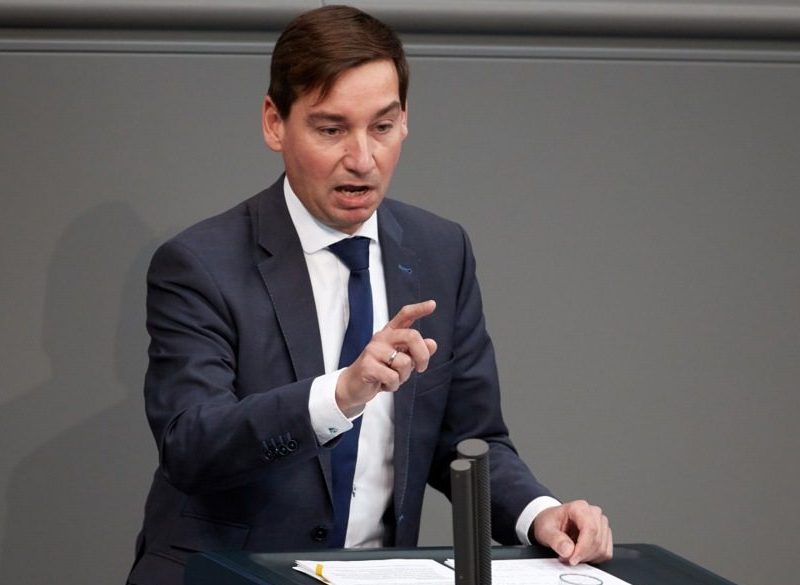
As tensions between Germany and Poland’s nationalist government continue to brew, asenior lawmaker in Germany’s coalition government blasted Warsaw on Thursday over what he called a “disgraceful” plan to end arms supplies to Ukraine, attributing it to electoral motives by Polish ruling PiS party.
Meanwhile, Lithuania has decided to intervene as a mediator to end the diplomatic spat, threatening to destroy Europe’s unity against Russia’s aggression.
Prime Minister Mateusz Morawiecki from the nationalist Law and Justice party (PiS – ECR) told Polsat News on Wednesday that his country would not deliver new weapons to Ukraine over a dispute on grain export routes.
A spokesperson clarified later that Poland would still stand by its past delivery commitments.
Several members of the ruling Law and Justice (PiS) party criticise Kyiv for siding with Germany and forgetting that Poland provided Ukraine with a helping hand from the first days of the war against Russia.
For its part, the opposition accuses PiS of being unable to negotiate with the EU and Ukraine.
Poland’s decision to maintain the ban on Ukrainian grain imports was met with protest in Ukraine, with the government taking Warsaw to the WTO and President Volodymyr Zelenskyy accusing “some countries”, without mentioning Poland by name, of “creating a thriller” over grain imports and thus serving Moscow.
German Agriculture Minister Cem Özdemir accused the Polish of “only showing solidarity when it suits them”.
“It’s a true disgrace that Poland, so far a reliable partner, ends its military support just now and communicates it like that,” Ulrich Lechte, an MP and spokesperson on foreign affairs for the pro-market FDP party, told Welt.
The move was clearly an “election strategy by the PiS government to divert attention from its visa scandal”, claimed Lechte as he accused the ruling PiS party of campaigning “at the expense of Ukraine”.
Recently, it was revealed that PiS officials had issued work visas to non-EU citizens in exchange for bribes despite the Polish government’s vocal criticism of increased migration.
As Poles head to the polls on 15 October for a general election, PiS has been keen to play down the scandal.
Elections campaign fuels anti-German sentiment
The ongoing election campaign has also fuelled heated rhetoric between Poland and Germany, as PiS seeks to exploit anti-German sentiment among the Polish population.
Most recently, PiS released a campaign ad in which party leader Jaroslaw Kaczynski scolds a fictional German official for allegedly trying to influence Polish pension policy.
The ruling PiS party often accuses opposition leader Donald Tusk (Civic Platform – European People’s Party/EPP) of being close to Germany.
“I hope that this rhetoric will not prevail and that Polish civil society will not be influenced by it,” Sebastian Hartmann, vice-chairman of the German-Polish parliamentary group in the Bundestag, told Euractiv in response.
The Polish election campaign was “deliberately charged with resentment”, Hartmann noted.
It is an awkward subject for the German government, which has made closer ties with Poland a key goal of its mandate.
“A deep friendship unites Germany and Poland,” reads the current coalition agreement adopted by the three parties in government in 2021.
It also promises progress in civil and cross-border cooperation and a desire to strengthen the Weimar Triangle trilogue format with Poland and France.
In an interview with Euractiv earlier this week, the EPP’s Secretary General Thanasis Bakolas described Tusk – whose Civic Platform party is affiliated with the EPP – as a “real hero”.
“We know what kind of politics PiS is all about, we know the methods they use. I am in awe of the fight that Donald Tusk is waging in Poland every day – very honourable and very gutsy,” Bakolas said, adding that all pro-EU political forces should back Tusk.
“These elections are about defending the fundamental rights of people and Polish democracy”, he added.
Vilnius: End the spat immediately
Meanwhile, Lithuanian President Gitanas Nausėda intervened in the Poland-Ukraine growing spat, urging the two countries to solve the diplomatic crisis over the grain embargo.
“For the sake of our common and most important goal – the protection of Europe from Russia’s aggressive expansionist policy – the differences between Ukraine and Poland must be resolved as soon as possible,” Nausėda said in a statement to the BNS press agency.
“We need to find a solution because further aggravation of the crisis would be irresponsible”, he said at a meeting with Ukrainian and Polish leaders at the UN General Assembly in New York as he praised Poland’s role in helping Ukraine thus far.
As he met his counterparts from both countries, Zelenskyy and Andrzej Duda, the Lithuanian president also discussed ways to facilitate grain transport through Poland and increase transit through Lithuania to reduce the pressure on Poland, the Lithuanian president’s office said.
According to Lithuanian Defence Minister Arvydas Anuszauskas, Warsaw’s position on arms deliveries to Kyiv has not changed, and the media have distorted Morawiecki’s words.
“I’m not going to comment on words taken out of context, especially when (in reality) they sound completely different,” he told reporters when asked about the Polish prime minister’s statement.
He also said that he had met with defence ministers from other countries to discuss support for Ukraine, the Ramstein format, coalitions and supplies and that he did not have the impression that Poland’s position on arms supplies had changed in any way.
(Nick Alipour | Euractiv.de, Aleksandra Krzysztoszek | Euractiv.pl – Edited by Sarantis Michalopoulos | Euractiv.com)








